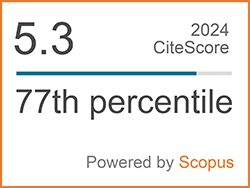Novel Halotolerant Cellulolytic Bacillus methylotrophicus RYC01101 Isolated from Ruminant Feces in Thailand and its Application for Bioethanol Production
Abstract
One impediment of large-scale biofuel production from lignocellulosic biomass is the insufficiency of cellulolytic microorganisms that can overcome extreme conditions during the industrial process. This study emphasized the isolation of a novel efficient cellulolytic bacterium. A new Bacillus methylotrophicus RYC01101, isolated from ruminant feces in Thailand, produced a hydrolysis capacity greater than that of known cellulolytic bacteria (Cellulomonas sp.). Cellulase activities were investigated on CMCase activity and FPase activity by 0.230±0.004 and 0.080±0.007 U/mL, respectively. B. methylotrophicus RYC01101 was co-cultured with Saccharomyces cerevisiae TISTR 5111 for bioethanol production. The productivity of the bioethanol was 1.38±0.40 g/L after 120 hours of fermentation. Moreover, B. methylotrophicus RYC01101 could be grown in the presence of 10% (w/v) NaCl, which could be applied in the pretreatment step of biofuel production. This study was the first report on cellulolytic activity and the halotolerant ability of B. methylotrophicus.
Keywords
Refbacks
- There are currently no refbacks.
 Applied Science and Engineering Progress
Applied Science and Engineering Progress







